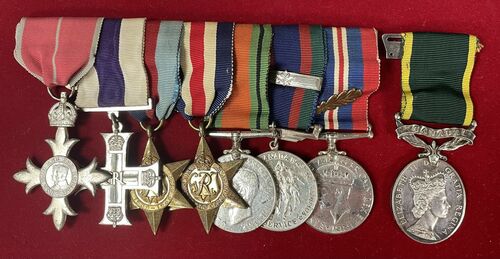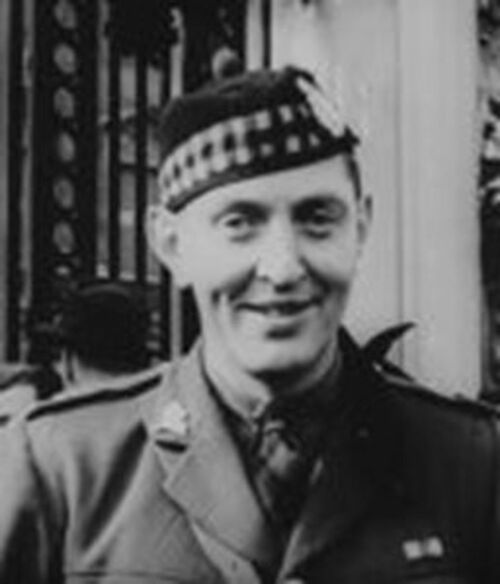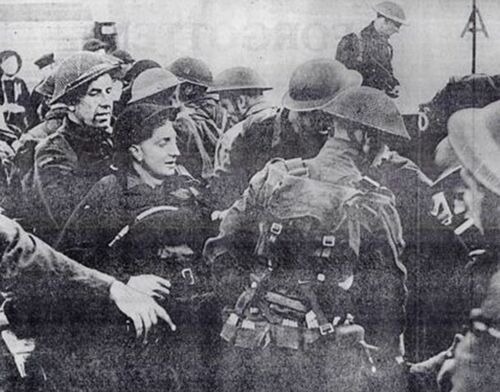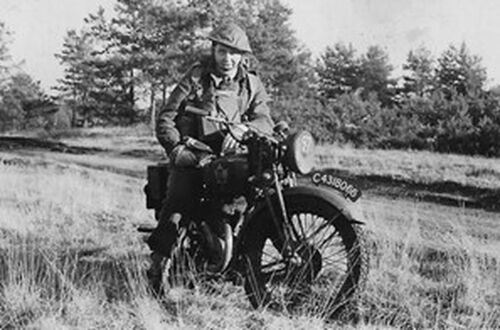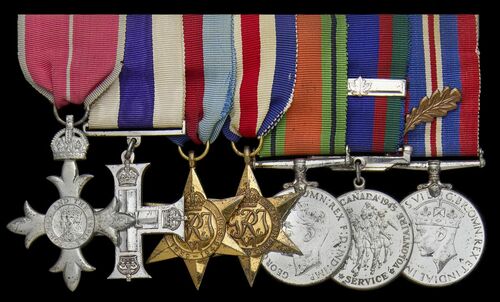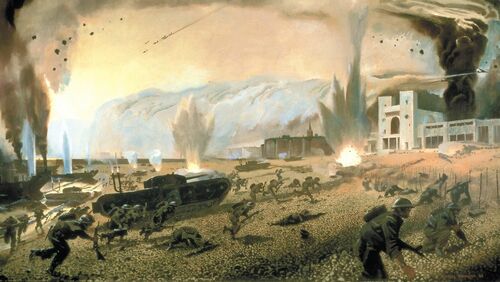Auction: 24002 - Orders, Decorations and Medals
Lot: 201
(x) An outstanding Second World War North-West Europe operations M.B.E., Dieppe raid M.C. group of eight awarded to Lieutenant-Colonel H. J. Kennedy, Essex Scottish Regiment, Canadian Army
The Most Excellent Order of the British Empire, M.B.E. (Military) Member's 2nd type breast Badge, silver; Military Cross, G.VI.R., the reverse officially dated '1942' and further inscribed 'Capt. H. J. Kennedy, Dieppe Augt. 19th'; 1939-45 Star; France and Germany Star; Defence Medal 1939-45, silver; Canadian Voluntary Service Medal, with Overseas Service Clasp; War Medal 1939-45, silver, with M.I.D. oak leaf; Efficiency Medal, E.II.R., Canada (Lt. Col. H. J. Kennedy), mounted as worn, this last a rare issue, lacquered, very fine (8)
Approximately 16 M.C.'s awarded for the Dieppe Raid.
M.B.E. Canadian Gazette 15 December 1945.
The original Recommendation states:
'Major Kennedy has served with 8 Canadian Infantry Brigade as a Brigade Major since late October 1944. During this period this formation has been through some of its most trying and difficult campaigning.
Major Kennedy has, with untiring zeal, always gone beyond the limits of his duty to assume responsibility for the training and operations of the Brigade. No effort has been too great nor problem, however difficult, has been too much for him. On many occasions this Officer, in addition to his own onerous duties, has cheerfully assisted brother officers with their duties in order to assume the success of operations.
Major Kennedy, by his quiet efficiency, untiring efforts and his capability, has earned not only the respect of his brother officers, but the admiration and affection of the officers and men working under him.
His knowledge of his work, initiative, ability and his cheerful execution of additional duties have imbued all he has come in touch with with confidence and enthusiasm.'
M.C. London Gazette 2 October 1942:
'In recognition of gallant and distinguished services in the combined attack on Dieppe.'
The Recommendation states:
'Captain H. J. Kennedy, during the action at Dieppe, 19 August 1942, was on board LCT 10 in charge of Wireless Communications with the forward troops. His No. 18 set was situated in a very exposed position on the ship, but with a total disregard for his own safety, he maintained contact with the troops on shore through-out the operation. Early in the morning Captain Kennedy was wounded in the leg, but remained at his set under heavy Artillery fire and machine-gun fire, although frequently requested to leave.
Captain Kennedy set a fine example of courage and devotion to duty.'
Hugh John Kennedy was born in Belleville, Ontario on 10 September 1908 but his parents moved to St. John, New Brunswick when he was a young. Having then graduated from Dalhousie University, he joined an accountancy firm in Windsor, Ontario.
Commissioned as a Lieutenant in the Essex Scottish Regiment in September 1939, he was embarked for England in July 1940, where the regiment undertook extensive training exercises, not least in the summer of 1942, in the lead up to Operation 'Jubilee', the disastrous Combined Operations raid on Dieppe on 19 August 1942.
Operation 'Jubilee' - massacre on the beachfront
Of the regiment's part in the Dieppe raid, much has been written. Confined to a section of beach only 800 metres long, under concentrated enfilading fire, it became almost impossible to breach the sea wall. One surviving officer estimated that 40 per cent of the regiment had been killed or wounded within 20 minutes of coming ashore:
'British Intelligence had failed to uncover detailed knowledge about the town, which the Germans had turned into a veritable fortress. They had razed buildings so that their weapons could have unobstructed fields of fire. Hotels hid snipers and sandbagged machine-guns. Gun emplacements were built in caves on the east headland. Even part of the casino had been demolished so that concrete pillboxes could be erected in the debris … '
In consequence just a few intrepid soldiers of the Essex Scottish made it into town, among them C.S.M. Cornelius Stapleton and his ten-man platoon, who made a 'mad dash' across the promenade. But with no sign of any other Canadian troops, they were compelled to beat a hasty retreat.
Meanwhile, supporting armour was swiftly dealt with on the beach by German artillery fire, just two tanks of the Essex Scottish sector making any headway at all. In fact, within an hour of their landing, all the survivors could do was to hug the sea wall for cover. Out of ammunition by 10.30 a.m., just a short window of opportunity to evacuate the wounded was possible, one of the lucky ones being Kennedy, who had been wounded. The remainder surrendered at 11 a.m.
Of the 553 men of the Essex Scottish who landed at Dieppe on that fateful day, only 51 - 27 of whom were wounded - returned to England. And 121 were killed, the unit suffering more casualties than any other.
Kennedy appears in the memories of Stewart Hastings Bull, who served in the unit:
'I'm Captain Kennedy, in charge of our company, and I've got news for us." Well, Captain Kennedy was a young man and he was feeling his oats because he had just been promoted to Captain. And he said, "Well, you ought to know that Mr. Ralston, the Minister of Defence, is coming to England to address the regiments that were in Dieppe. He wants to congratulate them." And I said, "Well, he hasn't got many people to congratulate, because they're all gone." But he said, "He's coming and he'll be here tomorrow, at Arundel Castle, which is the home of the Duke of Norfolk, and it's nine miles away and will take us three hours to march there. So, we better be there at 1500 hours and we'll be leaving at 0900 hours, and the battalion parade is at 0800 hours, and the platoon parade is at 0700 hours, and breakfast is at 0600 hours, and reveille at 0500 hours.'
North-West Europe
Having been advanced to Major in the wake of the Dieppe raid, Kennedy returned to an appointment in Canada, but he was re-embarked for the U.K. at the end of 1943.
He subsequently lent valuable service as Brigade Major and G.S.O. II (Operations) in 8th Brigade of the 3rd Canadian Division in North-West Europe and was present in the operations leading to the clearance of the Scheldt, in addition to the crossing of the Rhine.
He ended the war with an appointment in southern Holland in the summer of 1945 and was mentioned in despatches, in addition to being awarded the M.B.E.
Kennedy transferred to the Reserve of Active Officers on his return to Canada in November 1945 and was awarded the Canadian Efficiency Medal in 1958. Finally placed on the Retired List as a Lieutenant-Colonel in August 1969, he died at Hamilton, Ontario in July 1984, aged 75.
Sold with a small photograph album containing various wartime scenes, including some Dieppe and one or two 'souvenir' German postcards.
For his miniature dress medals, please see Lot 306.
Subject to 5% tax on Hammer Price in addition to 20% VAT on Buyer’s Premium.
Sold for
£10,000
Starting price
£3200

